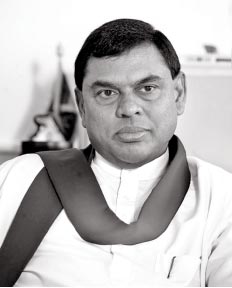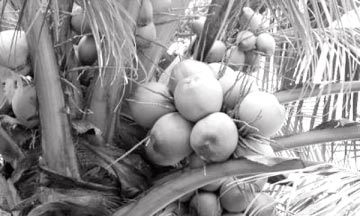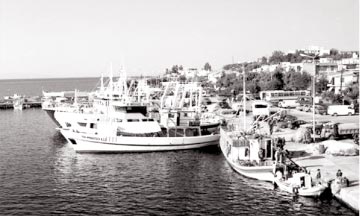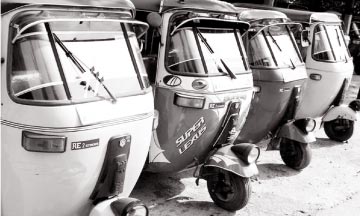|
Budget 2011:
Progressive, development-oriented
 The following is the speech made by Minister
of Economic Development Basil Rajapaksa during the Budget debate in
Parliament. The following is the speech made by Minister
of Economic Development Basil Rajapaksa during the Budget debate in
Parliament.
I am happy to wind up the debate on the Budget on behalf of the
Government. President Mahinda Rajapaksa in his first Budget after his
second swearing-in showed the direction in which he would lead the
country. I am also happy that the Tamil National Alliance (TNA) decided
not to vote for the Budget, but support the Government’s resettlement
program. Resettlement is in fact more difficult than settling anew! LTTE
terrorists mined the land, blasted roads, culverts, anicuts and
irrigation canals and destroyed schools. The Government imported
demining machinery worth over Rs. 700 million apart from the colossal
investment made on infrastructure development prior to the resettlement
of displaced persons. The subsidies for these took a heavy toll on State
coffers.
Under the Northern Rehabilitation emergency program of the Ministry
of Economic Development, we have allocated Rs. 100 million for 30 mini
irrigation projects - Kanakarayankulam Rs. 10 million, Mullikulam (Mannar)
Rs. 38 million, Periyapachchi Rs. 60 million, Kattawana - Maradamadhu Rs.
65 million, Welimarathamulla anicut Rs. 90 million, Adampan Rs. 50
million, Tharumadu anicut Rs. 50 million, Kanagawahai (Kilinochchi) Rs.
25 million, Pudalumuttu Rs. 40 million, Kokavil (Mullaitivu) Rs. 20
million, Pannankaman Rs. 20 million, Malavi Rs. 45 million, and repairs
to 10 irrigation canals and 10 ponds in Jaffna Rs. 50 million. In all,
we have expended Rs. 1,385 million for irrigation works and Rs. 1,065
million for roads.
Similarly, we had allocated Rs. 1,535 million to promote drinking
water schemes - Nedunkerny (Jaffna) Rs. 200 million, Adampan (Mannar) Rs.
195 million, Vettatalawita Rs. 195 million, Thevampity Rs. 170 million,
Oddusudan (Mullaitivu) Rs. 100 million, Malawita Rs. 200 million,
Pandiyakulam Rs. 200 million, Marthakery Rs. 25 million and
Velvettithurai Rs. 250 million. Sums worth Rs. 204.7 million have been
spent on 43 cooperative buildings, Rs. 1,672 million on 258 food,
fertiliser and paddy storage buildings; agrarian and school buildings
and other provincial office complexes were expanded, in addition to Rs.
99 million spent for peripheral roads. Under the Yali Pubudamu program,
Rs. 585 million for Yoda Wewa and Rs. 2,437 million for a number of
irrigation tanks in the Mannar district were allocated.
|

Rs. 200 million has been set aside to counter the coconut
blight |
The Northern Province received Rs. 244,835 million under the overall
northern development blueprint while of the foreign aid from the World
Bank, Japan and Asian Development Bank Rs. 8,416 million was allocated
to the North and the East in 2009. The other districts of the country
received only Rs. 3,581 million. In 2010, Rs. 8,057 million had been
allocated to the North and the East compared to Rs. 3,261 million for
the other districts of the country.
|

The fisheries sector recorded an in |
Roads, electricity, water and telecommunications are essential
components of national development which we have embarked upon. Of the
five major roads starting from Mullaitivu town, three are being
redeveloped. The remaining two roads will be redeveloped later.
As at May 19, Mullaitivu did not have any electricity. Today the
facility is available to 18 percent of the population; in Kilinochchi
and Vavuniya 66 percent - 75 percent have electricity, in Jaffna 60
percent - 72 percent and Mannar 37 percent - 52 percent. As at present
118 schemes have been completed at a cost of Rs. 826.2 million.
President Rajapaksa initiated action to restore the electricity supply
in the Northern Province.
Defence is given topmost priority in every democracy, without which
development and stability are impossible. In a way, it is an important
investment. For 30 years the country suffered due to terrorism and as
such national security is very important. There is a perceptible
improvement in the salaries of employees.
Capital expenditure
Let us draw our attention to capital expenditure. This expenditure is
on the decline. The capital expenditure for 2009 is Rs. 30,533 million.
It dropped to Rs. 14,451 million in 2010, while the provision for 2011
stands at Rs. 11,180 million. The deficit is around 50 percent - from Rs.
30,533 million to Rs. 11,180 million!
The recurrent expenditure has decreased from Rs. 174,973 million in
2009 to Rs. 170,848. Compared to the GDP, it has registered a decline of
3.63 percent in 2009, 3.06 percent in 2010 and 2.71 percent is projected
for 2011, 2.36 percent for 2012 and 2.07 percent for 2013.
Compared to the total budgetary provisions, the allocation for
defence represents a reduction which cannot be brought down. It is
pertinent to point out that the Defence Ministry provision includes
bodies such as the Hambantota International Conference Hall, UDA
Hambantota district office, Sri Lanka Coast Guard Department and several
other government agencies.
The eight percent increase in electricity tariff applies to those
consuming over 90 units. Of the 4,557,000 consumers 70 percent use less
than 90 units, 1,100,000 use between 1-30 units, 1,300,000 between 31-60
units and 800,000 between 61-90 units per month. We always encourage
people to protect the environment and save electricity. The increase in
tariff does not affect small-scale and middle level industries. A slash
of 25 percent in electricity rates has been effected as a concession to
places of religious worship, government hospitals, schools, vocational
training centres and universities. Our investment in electricity
generation in the next two years will exceed Rs. 64 billion in our
pledge to supply electricity to each residence and village.
Government organisations which suffered losses during the UNP regime
have recorded a profit of Rs. 11,982 million. It increased to Rs. 20,000
billion in 2010.
The projected profit for 2011 is estimated at Rs. 26,039 million. The
President re-vested in the Government several ventures such as Shell
Gas, Insurance Corporation, Telecom and SriLankan Airlines, the national
carrier, which will be made profitable.
Independent economy
The President during his recent swearing-in said that Sri Lanka
should be developed as a true Sri Lanka. Ours is an independent economy
with a national character. As in our foreign policy, our economy is also
non-aligned.
We have received aid and loans from new foreign sources. The Mahinda
Chinthana is our indigenous model! Though economic development is the
pivot, national development is not complete without social development,
political development and cultural and moral development!
Political freedom, media freedom, freedom of speech and universal
franchise are integral components of national development. The Mahinda
Chinthana gave pride of place to the individual to be followed by his
family, village, country and eventually the world! Similarly, the Budget
has given due regard to the aspirations of all sections of the
population.
As far as the urban sector is concerned, the gap between the haves
and the have-nots has reduced from .57 to .44. It is possible for us to
increase the GDP by investing in two or three mega projects or setting
up five or six blue-chip companies. On the contrary, our vision in
keeping with the Mahinda Chinthana is to ensure development from the
grassroots level, from the individual to family and village! The Budget
has provided relief to the vital sectors such as agriculture and
plantation, and for those engaged in paddy cultivation, tea, rubber,
coconut, condiments, subsidiary crops, and fisheries and livestock as
well.
The public servants, their counterparts in the private sector, and
those in foreign employment too have been given adequate relief. In
addition, three-wheeler drivers, self-employed persons, pensioners,
members of the Security Forces, small and medium level entrepreneurs,
professionals, expectant mothers, children, adults, women and the
disabled too have been adequately benefited by the Budget.
Tea Smallholders have earned an income of Rs. 6,375 million in
addition to the Government’s fertiliser subsidy of Rs. 1,000. Rubber
production too has registered a considerable increase followed by a
similar increase in income as well. The RSS smoked rubber and crepe
rubber prices have gone up significantly. Compared to the previous Maha
season, the 2009-2010 Maha season has produced 2.63 million metric tons
of paddy, an increase of 10.3 percent.
Paddy cultivation
|

The removal of VAT on three-wheelers helps improve the prospects
for self-employment |
The Jaffna and Mannar districts have brought 4,424 ha and 2,741 ha
under paddy cultivation. Under the giant tank scheme, 2,741 ha in Mannar
will be expanded to 14,000 ha. The Eastern Province has cultivated paddy
on 150,696 ha, an increase of 10 percent compared to the previous year’s
135,000 ha. Due to the use of fertiliser the harvest has increased from
4,421 kilograms to 4,583 kilograms per hectare. A harvest of 1,559
million tons is expected during the Yala season - an increase of 23
percent. We hope that 2010 will be the landmark year in which we could
reach the highest ever target since Independence of 4,189 million tons -
an increase of 14.7 percent.
During the 2009-2010 Maha season maize, red onions and soya beans
recorded a harvest of 127,761, 31,734 and 1,353 metric tons - an
increase of 11.4 percent, 50.8 percent and 70 percent.
The potato and green chilies cultivation suffered a decline due to
the non-receipt of seed potatoes in time and farmers giving up green
chillie cultivation in favour of paddy cultivation.
The soya beans cultivation was rescued at the 11th hour since we made
arrangements to purchase the harvest for Triposha. The sharp drop in the
Kurakkan and black gram cultivation was offset by the Government’s
incentives for farmers. At present black gram cultivation is flourishing
in the North and Vavuniya.
The increase of the subsidy to Rs. 50,000 per hectare for tea
smallholders, a recycling loan facility, incentives for plantation
companies for replanting, redistribution of land among the planters for
new planting, encouraging the Tea Research Institute to improve
techniques, research on high quality tea production and increase of cess
duty to Rs. 10 per kilogram of tea for export are some of the
progressive measures in the Budget.
The drop in coconut prices last July and the overall decline in the
industry have discouraged coconut cultivators. Rs. 200 million has been
set aside to counter the blight which took a heavy toll on coconut
cultivations in the South. It is now opportune to rehabilitate the
coconut industry while promoting alternative cultivations.
Several measures have been taken to upgrade rubber cultivation in the
country. New planting in Moneragala, Vavuniya and the Mullaitivu
districts, the increase of the subsidy for replanting, a further subsidy
of 50 percent to improve cultivation, and the increase of the Rubber
Control Department’s position from Rs. 500 million to Rs. 750 million
are some of the steps taken to improve the industry. The President has
launched a program to upgrade seed farms.
Seed farm development
The implementation of a three-year seed farm development program at a
cost of Rs. 700 million, the Agriculture Department’s project to work
with the private sector to expand the seed farms, a five-year tax
holiday for investment in seed farms, improvement of quality seeds and
the fertiliser subsidy are salient features of the Government’s
commitment to ameliorate the agriculture sector. Due to the increased
investment, the fisheries sector in 2010 recorded an increase of 171,100
metric tons - an increase of 10.5 percent compared to the previous year.
The fishing industry in the North and the East is also in progress.
Action has been taken to increase the harvest in the Northern and
Eastern Provinces by 50 percent. The Budget in providing relief to the
fisherfolk, has done away with levies such as registration fees and
repair charges. The Budget has proposed to provide loans at a seven
percent concessionary interest rate to encourage inland fishing.
Facilitating long-term loans and a five-year tax holiday are other
measures proposed. We have set apart Rs. 300 million for the Tourist
Development Authority to upgrade the tourist industry in traditional
fishing villages.
We have also taken steps to herald a self-sufficient domestic
economy, which could in turn ensure a nutritious meal to the
beneficiaries. Relief has also been provided to 400,000 milk farmers
under the expansion program of the Livestock Department service network.
The President took the initiative to improve the standard of living
of around 1.3 million public servants when others attempted to reduce
the strength of the public service. This Budget too has provided
adequate relief to the public servants such as a five percent salary
increase benefiting 1.3 million, and an increase of Rs. 600 from
January, which works out to an overall increase of a minimum of Rs.
1,250.
Some could even draw as much as Rs. 3,000 per month. Around 800,000
public servants will benefit from the removal of salary anomalies to be
implemented in July.
University lecturers have been assured an allowance of 25 percent. We
will extend duty free concessions to around 30,000 professional and
management personnel to import vehicles. Ten thousand graduates will be
recruited and employment opportunities would be expanded in State banks
and other financial and management institutions. Over 1,300 nurses would
be recruited to the Security Forces.
Relief for employees
The Budget has also provided relief to 4.5 million private sector and
corporation sector employees. The pension scheme for the private sector
has made it more attractive to prospective job seekers. The relief
provided in the Budget is diverse. The exemption of those earning less
than Rs. 50,000 in monthly income from tax which benefits around 200,000
middle level income earners, limiting PAYE Tax to Rs. 600,000 per year,
increasing the income tax limit from Rs. 300,000 to Rs. 500,000,
exemption from tax on interest benefiting over 4,000,000 including
pensioners, exemption of EPF benefits of 50,000 corporation and private
sector employees from tax are other progressive measures in the Budget.
The President has set aside one billion rupees as initial capital for
the proposed pension fund for over 1.6 million of expatriate workers who
remit foreign exchange to the country. The Budget has provided
considerable relief to those self-employed. The removal of VAT on
leasing vehicles such as three-wheelers, lorries and private coaches
helps improve the prospects for self-employment. It has brought direct
relief to over 550,000 people engaged in the transport service. The
customs duty on spare parts too has been withdrawn as a measure of
relief.
Steps have also been taken to introduce an instant loan scheme
through the People’s Bank and Samurdhi Bank to improve the lot of
pavement hawkers. The setting up of a self-employment bureau,
appointment of special offices to each Divisional Secretariat to provide
solutions to problems confronting small-scale traders, tax exemption of
three-wheelers, and vehicles transporting agricultural commodities,
establishment of a Citizens Pension and Insurance Fund to which
fishermen, farmers and the self-employed could contribute, are the other
people-friendly Budgetary proposals.
Special attention has been paid to the potential in floriculture,
including ornamental plants. The Botanical Gardens have launched a Rs.
100 million project to train local women in floriculture.
Pensioners’ lot
The pensioners’ lot too has been improved. Each pensioner will
receive an increase of Rs. 250 from next month as pension while those
who had retired prior to 2003 will be entitled to Rs. 750, which total
Rs. 1,000. Pensioners who retired between 2003 and 2006 will receive an
additional Rs. 250, and the earlier Rs. 250 making a total of Rs. 500.
There are 450,000 Government pensioners, and every pensioner will
receive an increase of Rs. 1,000 per month from January while those who
retired between 2003 and 2006 will be entitled to Rs. 500.
To improve the economic status of soldier families Rs. 3,000 million
has been provided for three years. A sum of Rs. 100,000 will be awarded
to the third child born to soldier families. The removal of debit tax,
reducing VAT from 20 percent to 12 percent, lowering tax on profit from
35 percent to 28 percent and the relief extended to bakery owners and
those in the tourist industry are other relief measures included in the
Budget.
Constraints such as taxes on the gem and jewellery industry and
garment industry have since been withdrawn.
Software has been exempted from VAT and Nation Building Tax. A sum of
Rs. 50 million has been provided to give relief for professionals,
artistes, media personnel and sportsmen whose role is considered
significant in the context of national development. The Budget has
proposed to set up a National Sports Development Fund and set aside 10
percent of the revenue earned from income from lotteries and tourist
hotel room charges to promote sports.
The provision for expanding the Thriposha program and improving the
‘nutrition pack’ for expectant mothers has been increased from Rs. 1,100
million to Rs. 1,500 million. A sum of Rs. 200 million has been
allocated to upgrade pre-schools in village areas to benefit over
200,000 students. Benefits will also accrue to over 600,000 adults and
wage earners of around 600,000 Samurdhi families with the grant of one
billion rupees to enhance the monthly assistance for adults,
differently-abled persons and those rendered helpless due to terrorism.
Wonder of Asia
We will invest in ports, airports, highways and power generation
projects to make Sri Lanka the Wonder of Asia.
Steps have also been taken to improve knowledge via upgrading the
level of pre-schools and 1,000 primary schools, developing English
language skills, increasing facilities for universities, upgrading a few
local universities to international standard and granting a 25 percent
salary increase for university lecturers.
We have allocated Rs. 30,000 million for the fertiliser subsidy, Rs.
2,050 million for nutrition packs, Rs. 250 million to provide a glass of
milk to students, Rs. 2,400 million for school textbooks, Rs. 1,595
million for school uniforms, Rs. 1,400 million for season tickets, Rs.
9,300 million for the Samurdhi subsidy and Rs. 2,892 million for public
assistance. We have also provided Rs. 12,500 million for the disabled
war heroes. For the first time we succeeded in restricting the Budget
deficit to 6.8 percent of the GDP.
All these worthy tasks could be accomplished because our gallant
Security Forces heralded peace throughout the country. Therefore on
behalf of the Government, I thank the Defence Secretary Gotabaya
Rajapaksa and the Security Forces and the media.
I also wish to thank those who stood by the Government despite
misleading disinformation campaigns and voted President Mahinda
Rajapaksa and this Government to office with an unprecedented majority
vote.
Translated by K.D.M. Kittanpahuwa
|

